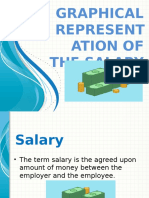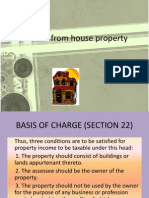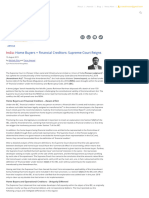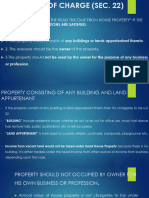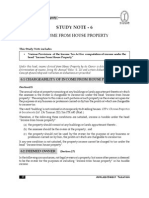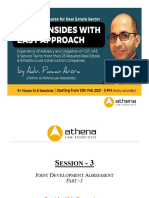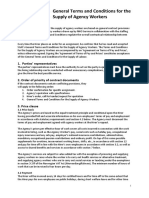Uae Vat Faq
Uae Vat Faq
Uploaded by
Tripti Chaturvedi 874Copyright:
Available Formats
Uae Vat Faq
Uae Vat Faq
Uploaded by
Tripti Chaturvedi 874Original Description:
Original Title
Copyright
Available Formats
Share this document
Did you find this document useful?
Is this content inappropriate?
Copyright:
Available Formats
Uae Vat Faq
Uae Vat Faq
Uploaded by
Tripti Chaturvedi 874Copyright:
Available Formats
BETA CONSULTANTS
UAE VAT
FAQ ON REAL ESTATE TRANSACTIONS
1. What is Real Estate?
Real estate is generally considered to be property consisting of land or buildings, and includes:
• Any area of land over which rights or interests or services can be created;
• Any building, structure or engineering work permanently attached to the land;
• Any fixture or equipment which makes up a permanent part of the land or is permanently attached to the
building, structure or engineering work.
2. What is a supply of real estate?
For VAT purposes, a supply of real estate is treated as a supply of goods (see Article 2 of VAT Executive
Regulations).
As a result, a supply of real estate involves the transfer of ownership of the real estate, or the right to use the
real estate, to another person.
3. How is the time of supply ascertained for real estate transaction?
Time of supply for real estate transactions will be ascertained as per nature of supply of transactions as stated
below:
a. For one-time payment for sale or lease – earliest of any of the following dates:
1. The date on which property is transferred, or
2. The date on which possession of property is handed over, or
3. The date on which construction of the property is completed, or
4. The date of receipt of Payment, or
5. The date on which Tax Invoice was issued.
b. For any contract that includes periodic payments or consecutive invoices - earliest of the following
dates:
1. The date of issuance of Tax Invoice, or
2. The date of payment is due as shown on the Tax Invoice, or
3. The date of receipt of payment.
In the event that 12 months has passed from the date of provision of the goods or services and none of the above
events has occurred, date of supply will be triggered at the 12-month point.
The certification of a construction project at a particular point in time will not trigger the date of supply for
VAT purposes. However, certification of a project is often linked to other obligations such as a due date for
payment, which may itself trigger the date of supply.
4. Are real-estate transactions taxable under UAE VAT?
Yes, it is taxable as supply of real-estate is treated as a supply of goods.
However, there are exceptions, and certain supply under real-estate are either zero rated or are considered as
exempted supply.
5. What type of real-estate transactions are Exempted?
Following types of real-estate transactions are exempted from UAE VAT:
a. Supply of existing residential property (Further discussed in Q. No. 11)
b. Supply of Bare Land. (Further discussed in Q. No.19 & 20)
Beta Consultants May 2018
6. What type of real-estate transactions are Zero Rated?
Following types of real-estate transaction are zero-rated (0% VAT) from UAE VAT:
a. First Supply of a residential building. (Further Discussed in Q. No. 10)
b. Supply of a new charitable building.
Note: Supply of real estate made within Designated Zone are outside the scope of UAE VAT.
7. What is a residential building?
A residential building is a building which is intended and designed for human occupation.
8. What is not a residential building?
Following are not considered a residential building/property:
• Any place that is not a building fixed to the ground and which can be moved without being damaged;
• Any building that is used as a hotel, motel, bed & breakfast establishment, or hospital or the like;
• A serviced apartment for which services in addition to the supply of accommodation are provided;
• Any building constructed or converted without lawful authority.
9. Which supply of residential building is taxable at standard rate of tax?
Generally, Supply of residential building is either exempted or zero rated, however in case of Supply of
residential property for period not more than 6 months to a person who does not hold ID card issued by Federal
Authority for Identity and Citizenship is taxable at standard rates.
10. Which supply is considered to be “First supply of residential building” to be zero rated?
The ‘first supply’ includes a supply of the building by either sale or lease, but it must be made within 3 years of
the buildings’ completion date. This treatment shall apply regardless to whom the building is supplied to (e.g.
a registered customer, a non-registered customer, a related party etc.) provided that it is supplied within the
relevant timeframe.
Any subsequent supplies of the building, either by sale or lease, within 3 years from its completion date shall
not be zero-rated, as they will not qualify as the first supply of the building.
11. Which supply is considered to be “existing residential property” that is exempted?
The supply of a residential building other than the first supply, is exempt from VAT. This includes where the
subsequent supply of the property is supplied within 3 years from the buildings’ completion.
12. Can supplier of existing residential property claim the input VAT on costs related to the building?
Where the supplier of the residential building incurs VAT on costs relating to such a subsequent supply e.g.
agent fees or incurs VAT on costs relating to the general upkeep and maintenance of the property after the first
supply, then such costs are considered to directly relate to the exempt supply of the building. As such, the
supplier will be unable to recover any VAT on such costs via its VAT return.
13. Are charges collected from tenants for maintenance or upkeep of the property by the owner taxable under
VAT?
A community master developer or building owner will often make charges to the owners or tenants of units
within the community/building in return for the upkeep of the communal areas of the property. Such charges
will be subject to VAT at the standard rate, on the basis that they represent a charge for the services of
maintaining and running the communal areas.
Beta Consultants May 2018
14. Are Labour camps residential buildings?
Labour camps are generally areas where labourers are housed by their employers. They can take many different
forms, and some may provide residents with additional services on top of the living accommodation.
It is therefore necessary to consider on a case by case basis whether a labour camp meets the definition of a
residential building.
15. If an employer charges the employee a consideration in exchange for the residential accommodation will
it be taxable under VAT?
This shall be treated as a supply for VAT purposes. The consideration received will either be zero-rated (in
respect of the first supply of a residential building) or exempt from VAT. Consideration may be received from
an employee in a number of ways, including but not limited to:
• A direct charge made to the employee for the accommodation;
• A deduction from the employee’s salary in respect of the accommodation; and
• Provision of accommodation in lieu of the payment of a housing allowance to the employee.
Any costs which directly relate to the provision of that residential accommodation to the employee, for example
agent’s fees, shall normally be treated as relating to an exempt supply and shall not be recoverable.
16. In case an employer does not make a charge to the employee for the provision of residential
accommodation, will it be chargeable for VAT
If employer does not make any charge to the employee, provision of residential accommodation will not be
considered as supply for VAT purposes. However, it should comply with the following:
• It is a legal obligation to provide those services or goods to those employees under any applicable labour
law in the UAE or Designated Zone; or
• It is a contractual obligation or documented policy to provide those services or goods to those employees in
order that they may perform their role and it can be proven to be normal business practice in the course of
employing those people; or
• Where the provision of goods or services is a deemed supply under the provision of the VAT Decree-Law.
In such cases, any VAT incurred on costs relating to the provision of the residential accommodation may be
recovered as a general overhead cost of the business. This shall include VAT incurred on costs such as utilities
which service the residential accommodation, which are used by the employees for their personal benefit.
17. Are sales of residential buildings off plan or prior to completion taxable under UAE VAT?
The purchase of a residential building ‘off plan’ i.e. direct from the developer prior to construction of the
property, or purchase of a partly completed residential building, shall be zero rated, as a future supply of a
residential building or as it will be used for residential purposes. This is assuming that the relevant conditions
are met so as to be treated as a residential building.
18. Is a farm house considered as a residential building?
Farm houses which are located on agricultural land will be considered as residential buildings where they are
occupied or intended to be occupied as a person’s principal place of residence and meet the conditions to be
treated as a residential building.
Beta Consultants May 2018
19. What is a Bare Land and is supply of bare land taxable?
“Bare Land” under UAE VAT refers to barren land which does not have either a Completed building, a Partially
completed building or any Civil engineering works on top of the land:
The supply of bare land is exempt from VAT. This includes the supply by either lease or by sale. As a result,
any VAT on costs associated with the supply of bare land e.g. legal fees or agents’ fees, shall not be recoverable
by the supplier.
20. When is a supply of Bare Land considered as commercial land chargeable to tax?
Where a plot of land is supplied which does not meet the definition of ‘bare land’, it shall be considered to be
commercial land and the supply shall be subject to VAT at the standard rate. This will be evaluated on a case
by case basis.
21. When does construction reach a stage where it is considered to be a partially completed building?
Construction would be considered to be sufficient enough to represent a partially completed building when the
stage of the construction has progressed beyond foundation level.
22. When is land considered to be covered by civil engineering works?
Examples of civil engineering works include roads, bridges, and pipes used for mains water or power services.
Land will not be considered to be “bare land” where it is covered by civil engineering works which are complete,
or partially complete.
23. What is a farm Land?
Farm land will normally be considered to be commercial land as it will normally be covered with infrastructure
or civil engineering works required to make it operational as a farm e.g. irrigation systems, roads, utility
connections etc. It will be necessary, however, to assess each supply of land on a case by case basis to confirm
whether it meets the definition of bare land or covered land.
24. How will the leasing of bare land for development impact the taxability of revenue?
Where a landlord leases a plot of land to a tenant who intends to develop on the land, it is important that the
landlord identifies whether he is supplying bare land or covered land to the tenant.
It may be the case that a landlord supplies land to a tenant which meets the definition of “bare land” at the point
it is first leased to the tenant, however once the tenant begins to develop on the land then the nature of the
landlord’s supply will change.
As soon as the land becomes covered by completed or partially completed buildings or civil engineering works,
the landlord will no longer be making a supply of bare land to the tenant. From the point the land ceases to be
bare land, the landlord should charge VAT at the standard rate to the tenant.
25. What is the payment process for sale of commercial real estate?
A special payment process exists where sales of commercial real estate are made within the UAE.
The special payment process applies only in the case where commercial real estate is sold in the UAE by any
supplier other than the developer of that property and would be subject to VAT at 5%. Therefore, it does not
apply to the following:
Beta Consultants May 2018
• Sales or leases of residential property;
• Leases of commercial property
• Sales of commercial property by the developer of that property; and
• The sale of commercial property with the benefit of sitting tenants to a buyer who is a taxable person
which qualifies as the transfer of a business.
In such cases, the seller of the property will issue a tax invoice to the buyer in relation to the sale proceeds of
the property as normal.
However, before completing the ownership transfer process with the Land Department, the buyer of the
commercial property will be required to pay the VAT due on the purchase directly to the FTA.
Once the payment of the VAT has been made to the FTA, the buyer will receive a Payment Transaction Number.
The buyer will be required to produce the Payment Transaction Number to the Land Department in order to
process the ownership transfer. Without this evidence that the VAT on the purchase has been paid, the purchase
of the property cannot proceed, and this will lead to delays.
The supplier will declare the output tax due on the property within its VAT return in the normal way and will
then also include the value of the output tax in the adjustments column of the return. This will avoid paying the
output tax to the FTA twice.
In all other cases, the normal VAT rules regarding VAT accounting and payment are applicable.
26. What is a mixed-use development?
A mixed-use development is a building or plot of land which has clear and distinct areas which are put to
different uses which would have a different VAT treatment when supplied. For example, a building which has
retail units on the ground floor level, office or commercial space on the middle floors of the building and
residential units on the top floor would be considered a mixed-use development.
27. How is the Input VAT on repair and maintenance cost of mixed used development recovered?
Input tax incurred on the repair and maintenance costs of a property which is used for wholly commercial
purposes is recoverable in full.
Input tax incurred on the repairs and maintenance of a property which is used for wholly residential purposes is
not recoverable.
Where input tax is incurred on a property which is used for both commercial and residential purposes, the
taxpayer is required to directly attribute the VAT on costs incurred as far as reasonably possible. (i.e. On
proportionate basis and claim input vat only attributable to commercial portion)
28. What is an Owners Association?
Owners associations (“OA’s”) are often established to manage and administer the common areas of a building
on behalf of all the owners of a building. They commonly deal with issues such as cleaning, maintenance,
security etc. and are often comprised of members which are the owners of the individual units themselves.
Beta Consultants May 2018
29. Is an Owners Association required to be registered for VAT purposes?
An Owners Association is required to register for VAT. Although OA’s can take many different legal forms
and can enter into arrangements with suppliers and tenants, in multiple different ways, they will be making
taxable supplies or undertaking an economic activity and the normal VAT rules will apply.
30. How does a master developer recover Input VAT on infrastructure costs?
Where a master developer incurs VAT during constructing communal infrastructure on a large plot of land, such
costs are incurred in the normal course of the master developer’s business. As such, the VAT on such costs
should be recoverable as a general overhead cost of the business.
Where the business makes full taxable supplies, the VAT incurred on the infrastructure costs shall therefore be
recoverable in full.
However, where the smaller plots of land in the master community are sold as bare land they shall be exempt
from VAT, with no right to recover any VAT.
If a mixture of bare land and commercial real estate is sold from the site, then the VAT incurred on infrastructure
costs should be apportioned under the normal input tax apportionment rules.
31. What is tax treatment for inducement?
Where a landlord pays a prospective tenant to enter into a lease, the tenant is considered to be making a supply
to the landlord of agreeing to enter into a contract. If the tenant is registered for VAT then his services shall be
subject to VAT at 5%, regardless of whether the property is a commercial or residential property.
Where the prospective tenant is not VAT registered any inducement paid by the landlord is outside the scope of
VAT.
32. How is the rent-free periods granted by landlord treated for VAT purpose?
Where the landlord grants a rent-free period in return for no consideration, the rent-free period does not normally
constitute a supply for VAT purposes. This is only the case where the tenant is not obliged or required to provide
anything in return, and the tenant is not a related party.
However, if a tenant undertakes to provide anything to the landlord in return for the rent-free period, this would
represent a barter transaction. For example, a landlord may grant a rent-free period to a tenant in return for the
tenant agreeing to refurbish the property. In such cases, both supplies will be of equal value, but will not
necessarily have the same VAT liability (for example, where the landlord is supplying residential property).
Where VAT is charged on the value of the barter transaction this would be recoverable subject to the normal
rules.
33. Is consideration paid for lease surrender or making variation in lease agreement taxable?
If a landlord pays a tenant or licensee to surrender any interest in, right over or licence to occupy land or make
variation in lease agreement, then that is a supply to the landlord by the tenant. The tenant is considered to be
making a supply of agreeing to exit the lease early or amendment in lease agreement. If the tenant is registered
for VAT then his services shall be subject to VAT at 5%. This is regardless of whether the property is a
commercial or residential property.
34. Is contribution by landlord towards tenants’ costs are taxable?
Simple contributions to tenants’ costs do not constitute a supply by the tenant to the landlord unless there is a
contractual obligation for the tenant to do something in return for the contribution received.
Beta Consultants May 2018
35. What is dilapidation payment and are they taxable?
The terms of a lease may provide for the landlord to recover from tenants, at or near the termination of the lease,
an amount to cover the cost of restoring the property to its original condition. The amount is often agreed
between the parties and may be based on a surveyor or contractor’s estimate.
Depending on the terms of the contract, dilapidation payments which are paid as damages or for breach of
contract relating to a requirement to properly maintain the property may be considered to be outside the scope
of VAT.
However, if the dilapidation payment represents consideration for repairs and maintenance works which should
have been undertaken over the life of the lease by the tenant and which will be undertaken by the landlord, the
payment involved is the consideration for a supply for VAT purposes and is subject to VAT at 5%.
36. How is the place of supply of real estate is determined?
Any real estate located in the UAE (except property located in a Designated Zone) is supplied in the UAE. As
a result, it will be subject to UAE VAT.
37. How is the place of supply of real estate related services determined?
Where a supply of services is considered to be related to real estate, the place of supply of the services is where
the real estate is located. Therefore, any services which are related to real estate located in the UAE shall also
be treated as supplied in the UAE and UAE VAT will be applicable on the supply.
If a land related service is provided alongside other services that don’t relate to land it will be necessary to
consider whether there are separate supplies being made or a single composite supply to which other services
are ancillary. If there is a single composite supply directly related to land, this treatment covers all the elements
that make up the supply. If there are multiple supplies each will need to be considered on its own.
38. Are Non-Resident landlords required to registered under VAT?
The VAT registration threshold for non-residents who make taxable supplies in the UAE is nil. Where a non-
resident landlord makes any taxable supplies related to any real estate located in the UAE, they will be required
to register, charge and account for VAT.
39. Are construction services for building residential buildings taxable?
Construction services which are supplied in the UAE are subject to VAT at 5%. This VAT treatment will apply
regardless of the type of building which is being constructed.
40. How is the date of supply for construction service is determined?
The normal date of supply rules applies to construction services in the same way as they apply to any other
service i.e. the date of supply will be the earlier date of the following:
Please refer Q.3 for more details
41. How are the retention payments related to construction services taxed?
There are no special rules for determining the date of supply in relation to retention payments, therefore the
normal date of supply rules must apply.
If the services are considered to have already been completed by the supplier, the date of supply will be triggered
on the date the services were completed (or on the date of issue of the tax invoice or receipt of payment if
Beta Consultants May 2018
earlier). However, if the services are not contractually treated as completed until such time that the sign off is
given by the recipient, then the date of supply will be delayed until the earlier of:
• The time the retention payment has been made;
• The work has been signed off as complete; or
• The tax invoice has been issued.
This means that where the construction services are not considered to be contractually complete, VAT is only
due to the extent of any payments received or invoices issued during delivery of the services. The VAT
applicable on the retention payment would not be due to be accounted for by the supplier until the time the
retention payment is received by the supplier, or an invoice in respect of the retention payment is issued,
whichever is earlier.
42. Can an individual claim refund on VAT payments made for construction of new residences?
Where a UAE citizen owns or acquires land in the UAE on which the person builds or commissions the
construction of his own residence, he shall be entitled to make a claim to the FTA to repay the VAT on the
expenses of constructing the residence. The claim may only be made by a natural person who is a UAE national.
43. What are the conditions which required to be fulfilled to claim the refund on payment for construction
of new residences?
In order to claim a refund of the VAT incurred on the construction of a residence, the following conditions must
be met:
• The claim may only be made by a natural person who is a UAE national;
• The claim must relate to a newly constructed building to be used solely as the residence of the person or the
person’s family; and
• The claim may not be made in connection with a building that will not be used solely as a residence by the
person or the person’s family, for example if it is to be used as a hotel, guest house, hospital or for any other
purpose not consistent with it being used as a residence.
The refund claim must be lodged with the FTA within 6 months from the date of completion of the newly built
residence.
44. What are the eligible costs incurred on construction of new residence, for which VAT refund may be
claimed under the scheme?
Where a person is eligible to submit a refund claim under the scheme, VAT may be reclaimed on the following
categories of expenses:
• Services provided by contractors, including the services of builders, architects, engineers and other similar
services necessary for the successful construction of the residence;
• Building materials, being goods of a type normally incorporated by builders in a residential building or its
site, but not including furniture or electrical appliances.
Goods are normally considered to be incorporated into a building when they are fixed in such a way that the
fixing or removal of those goods would either require the use of tools or result in the need for remedial work to
the fabric of the building, or substantial damage to the goods themselves.
Examples of goods which are not considered to be incorporated into the building include: Appliances; Furniture
which is not fixed into the building such as sofas, tables, chairs etc.; and Landscaping, such as trees, grass and
plants.
Beta Consultants May 2018
Examples of goods which are considered to be incorporated into the building and would be eligible for a refund
of VAT include: Central Air conditioning; Doors; Fire alarms and smoke detectors; Flooring (excluding
carpets); Kitchen sinks, work surfaces and fitted cupboards; Sanitary ware; Shower units; Window frames and
glazing; Wiring when embedded inside the structure of the building.
45. How one can submit the refund application for VAT incurred on construction of new residence?
The VAT refund for New Residences can be claimed by completing a form available on the FTA website and
submitting it online, along with copies of supporting documents. It is important that copies of all documentation
(i.e. valid tax invoices) supporting the original payment of the VAT are retained in order for the claim to be
validated by the FTA.
Beta Consultants May 2018
BETA CONSULTANTS
Office No. B/410 Al Hudaiba Awards Building Block B, Madinat Dubai Almelaheyah, Dubai
P.O. Box 47279, Dubai, UAE
Tel: +971 4 327 4105 Makani Number: 25984 92686
Fax: +971 4 327 4106 GPS Coordinates:
Email: info@betaconsultants.ae 25.240401
Website: www.betaconsultants.ae 55.272313
Contact details:
Ravi Chitnis
Managing Director
Email: ravichitnis@betaconsultants.ae
Mobile: +971 50 654 4867
Disclaimer:
This summarized information is prepared for general guidance on matters of interest only. It does not constitute professional advice.
You should not act upon the information contained in this publication without seeking professional advice. As such, it should not
be used as a substitute for consultation with professional legal, tax or other advisers. The provision of this document do not constitute
opinions of any kind or any advertising.
Beta Consultants May 2018
You might also like
- Graphical Representation of The SalaryDocument25 pagesGraphical Representation of The SalaryNica Jane Macapinig100% (3)
- Income From House PropertyDocument8 pagesIncome From House Propertysuruchiba2049No ratings yet
- Income From House PropertyDocument14 pagesIncome From House PropertyshivNo ratings yet
- Income From House Property: Ms. Harmanpreet Kaur Assistant Professor Shivaji College University of DelhiDocument40 pagesIncome From House Property: Ms. Harmanpreet Kaur Assistant Professor Shivaji College University of DelhiRAKESH KUMAR GOUTAMNo ratings yet
- Tax Law PowerpointDocument7 pagesTax Law PowerpointAbhishekNo ratings yet
- Income From House Property: Chapter - 4 Unit - 3Document24 pagesIncome From House Property: Chapter - 4 Unit - 3srinidhivrNo ratings yet
- Chapter 5 Income From House Property PMDocument14 pagesChapter 5 Income From House Property PMMohammad Yusuf NabeelNo ratings yet
- 07 Income From Property (50 59)Document11 pages07 Income From Property (50 59)jafferyasim100% (2)
- House Property ChapterDocument64 pagesHouse Property ChapterManohar LalNo ratings yet
- Villanueva V City of IloiloDocument48 pagesVillanueva V City of Iloiloamun dinNo ratings yet
- Income From HP - 081115Document11 pagesIncome From HP - 081115mishalahammed540No ratings yet
- Income From House PropertyDocument79 pagesIncome From House PropertyPriyanka ToshniwalNo ratings yet
- RERA - Home Buyers Financial Creditors - Supreme Court ReignsDocument3 pagesRERA - Home Buyers Financial Creditors - Supreme Court Reignsparasshah.kljNo ratings yet
- Incomefromhouse Property JeevithaDocument22 pagesIncomefromhouse Property Jeevitharyanraj008No ratings yet
- 03 Income From House Property AY 25-26Document19 pages03 Income From House Property AY 25-26Aniruddha PanchalNo ratings yet
- PDF Document AB2D94598B09 1Document28 pagesPDF Document AB2D94598B09 120BRM051 Sukant SNo ratings yet
- Income From House PropertyDocument28 pagesIncome From House PropertyAshish SharmaNo ratings yet
- Advance Learning On TDS Under Section 194-I and 194-C: MeaningDocument52 pagesAdvance Learning On TDS Under Section 194-I and 194-C: MeaningTejTejuNo ratings yet
- 03 House PropertyDocument9 pages03 House PropertyJiya BoseNo ratings yet
- House Property - RemovedDocument27 pagesHouse Property - Removedhp5251453No ratings yet
- Tax Law 3 & 4Document26 pagesTax Law 3 & 4Akash LakraNo ratings yet
- Chapter 5Document9 pagesChapter 5CA Mohit SharmaNo ratings yet
- Unit 4 Land Law CheatingDocument4 pagesUnit 4 Land Law Cheatingketan cpjNo ratings yet
- FAQ (II) Real Estate Sector 1405Document9 pagesFAQ (II) Real Estate Sector 1405raj pandeyNo ratings yet
- Income From House PropertyDocument25 pagesIncome From House PropertyAakash MauryNo ratings yet
- New Capital Gain Tax Q& ADocument6 pagesNew Capital Gain Tax Q& Aarnold marianoNo ratings yet
- 1 Basic Concepts S.TAX-STDocument4 pages1 Basic Concepts S.TAX-STsunny_cmaNo ratings yet
- Income From House Property IIDocument40 pagesIncome From House Property IIAnirban BiswasNo ratings yet
- Income From House Property: Submitted To: Subimtted byDocument34 pagesIncome From House Property: Submitted To: Subimtted byArghia -No ratings yet
- Income From House PropertyDocument40 pagesIncome From House PropertyDrPreeti JindalNo ratings yet
- Greenburgh Complex LeaseDocument27 pagesGreenburgh Complex LeaseNewsdayNo ratings yet
- TDS Rent - 194I - 194C PDFDocument54 pagesTDS Rent - 194I - 194C PDFkashyap_ajNo ratings yet
- Income From House Property-6Document9 pagesIncome From House Property-6s4sahithNo ratings yet
- Incnome From Property NBSDocument59 pagesIncnome From Property NBSRamia KiranNo ratings yet
- Income From HP PDFDocument14 pagesIncome From HP PDFNanda NanduNo ratings yet
- Income From House PropertyDocument6 pagesIncome From House PropertyKamini PawarNo ratings yet
- Rating and Valuation Department - Tenancy MattersDocument10 pagesRating and Valuation Department - Tenancy MattersPikying CheungNo ratings yet
- Tax ProjectDocument12 pagesTax ProjectUtkarsh SinghNo ratings yet
- GST On Real Estate - Analysis of Notifications Issued On 29.03.2019 - Taxguru - inDocument8 pagesGST On Real Estate - Analysis of Notifications Issued On 29.03.2019 - Taxguru - inAnshulNo ratings yet
- Chapter-4b Income From House Property PDFDocument6 pagesChapter-4b Income From House Property PDFBrinda RNo ratings yet
- Real Estate - TaxationDocument13 pagesReal Estate - TaxationVinay SharmaNo ratings yet
- Income From House PropertyDocument32 pagesIncome From House PropertyDrishtiNo ratings yet
- House PropertyDocument7 pagesHouse Propertyatul.maurya0290No ratings yet
- Advance Learning On House PropertyDocument45 pagesAdvance Learning On House PropertyjaganvizagNo ratings yet
- 62289bos50449 Mod1 cp5Document41 pages62289bos50449 Mod1 cp5monicabhat96No ratings yet
- Income From House Property: After Studying This Chapter, You Would Be Able ToDocument35 pagesIncome From House Property: After Studying This Chapter, You Would Be Able ToLilyNo ratings yet
- Tax Capital V Ordinary AssetDocument3 pagesTax Capital V Ordinary AssetDenise DianeNo ratings yet
- Income From House Property: Section/Rule Subject MatterDocument21 pagesIncome From House Property: Section/Rule Subject Matterphanidhar varanasiNo ratings yet
- Income From House PropertyDocument37 pagesIncome From House Property9722274593No ratings yet
- Wa0015.Document17 pagesWa0015.pranay2258No ratings yet
- Income From House Property 12th July 23Document39 pagesIncome From House Property 12th July 23Ashish KumarNo ratings yet
- Chapter 7, 8, 12Document41 pagesChapter 7, 8, 12assadrafaqNo ratings yet
- Income From House Property: After Studying This Chapter, You Would Be Able ToDocument40 pagesIncome From House Property: After Studying This Chapter, You Would Be Able ToManoj GNo ratings yet
- Gam Wu Qobl NDMEHr K5 PNW I08 HDocument46 pagesGam Wu Qobl NDMEHr K5 PNW I08 Hsamruddhi gharoteNo ratings yet
- Study Note: 8 Income From House Property: 8.1 Basis of Charge (Section 22)Document19 pagesStudy Note: 8 Income From House Property: 8.1 Basis of Charge (Section 22)T.S.G RamaraoNo ratings yet
- Income From House PropertyDocument12 pagesIncome From House PropertydipxxxNo ratings yet
- Capital Gains: Mutual AgreementDocument3 pagesCapital Gains: Mutual AgreementManas MohapatraNo ratings yet
- CA Ashok Batra Special Invitee, Indirect Taxes CommitteeDocument37 pagesCA Ashok Batra Special Invitee, Indirect Taxes CommitteeVenkat RajuNo ratings yet
- What Is The Immediacy TestDocument6 pagesWhat Is The Immediacy TestBo Dist100% (1)
- Tranzen1A Income TaxDocument46 pagesTranzen1A Income TaxMonica SorianoNo ratings yet
- CPA Paper 11 August 2024 SolutionsDocument9 pagesCPA Paper 11 August 2024 SolutionsBrian KisemboNo ratings yet
- Moot Problem Civil B.A.LL.B., B.B.A.LL.B., LL.B.Document15 pagesMoot Problem Civil B.A.LL.B., B.B.A.LL.B., LL.B.ishitaNo ratings yet
- Picture: Building of Cyprus Tourism Organization: (Source:)Document11 pagesPicture: Building of Cyprus Tourism Organization: (Source:)shakurullahNo ratings yet
- Powerpoint-09.14.22-Smmc Vat Zero Rating PDFDocument92 pagesPowerpoint-09.14.22-Smmc Vat Zero Rating PDFGirlie BacaocoNo ratings yet
- General Terms and Conditions For The Supply of Agency WorkersDocument8 pagesGeneral Terms and Conditions For The Supply of Agency WorkersIbrahim AbbasNo ratings yet
- CA. AJAY JAIN, 9310167881: Time Allowed - 3 Hours Maximum Marks - 100Document14 pagesCA. AJAY JAIN, 9310167881: Time Allowed - 3 Hours Maximum Marks - 100RishabNo ratings yet
- Of The Defunct Court of First Instance of AbraDocument68 pagesOf The Defunct Court of First Instance of AbraKim Boyles FuentesNo ratings yet
- Tax EvasionDocument42 pagesTax EvasionEzra Mikah G. CaalimNo ratings yet
- 107 181 1604457989289 Apple11ProMaxInvoiceDocument1 page107 181 1604457989289 Apple11ProMaxInvoiceEkagra GuptaNo ratings yet
- Sin TiruloDocument1 pageSin TiruloAlvaro RomeroNo ratings yet
- New GSTDocument30 pagesNew GSTSonia MohapatraNo ratings yet
- Economics Relab Learner Book Grd10 Final t1-4Document146 pagesEconomics Relab Learner Book Grd10 Final t1-4Favour Emeruh100% (1)
- 6021-P2-Lembar Kerja (TH 2022)Document41 pages6021-P2-Lembar Kerja (TH 2022)Nurul Jennah AgustinNo ratings yet
- What Is The RGSTDocument4 pagesWhat Is The RGSTMaira HassanNo ratings yet
- 2 BHK L (824 Sq. FT) City Facing Cost Sheet - Godrej NurtureDocument1 page2 BHK L (824 Sq. FT) City Facing Cost Sheet - Godrej NurtureAvinash ChavanNo ratings yet
- r12 e Business Tax ReportingDocument402 pagesr12 e Business Tax ReportingTejeshwar KumarNo ratings yet
- Homestead, Benami Transaction, Land Development Tax, Real EstateDocument30 pagesHomestead, Benami Transaction, Land Development Tax, Real EstateManjare Hassin RaadNo ratings yet
- ProblemsDocument12 pagesProblemsJohn Carlo J. DominoNo ratings yet
- 4 5809690519135061090Document47 pages4 5809690519135061090Äbřîśh Łìj MęŘãNo ratings yet
- E-Tender Document For Operating Branded Ice-Cream/Juice/Coffee Shop at New Terminal Building Allahabad Airport, AllahabadDocument43 pagesE-Tender Document For Operating Branded Ice-Cream/Juice/Coffee Shop at New Terminal Building Allahabad Airport, AllahabadPoojaNo ratings yet
- Edible Oil SummaryDocument34 pagesEdible Oil Summarytesfabelay75% (4)
- RBM Expenses - Truck 1411 (Additional) & JCDocument9 pagesRBM Expenses - Truck 1411 (Additional) & JCMark DerracoNo ratings yet
- Red Herring Prospectus of Walton Hi Tech Industries LimitedDocument557 pagesRed Herring Prospectus of Walton Hi Tech Industries LimitedIbrahim SohelNo ratings yet
- GST mcq1Document12 pagesGST mcq1Avik DasNo ratings yet
- Depreciation Chart 11-12 (FY)Document4 pagesDepreciation Chart 11-12 (FY)specky123100% (1)
- MCQ Pre-Long Exam On Value Added Tax May 19, 2020Document6 pagesMCQ Pre-Long Exam On Value Added Tax May 19, 2020JDR JDRNo ratings yet
- Miramar Fish CompanyDocument2 pagesMiramar Fish CompanyJenalin FloranoNo ratings yet
- Manish Final Project PDFDocument52 pagesManish Final Project PDFManish BaviskarNo ratings yet
